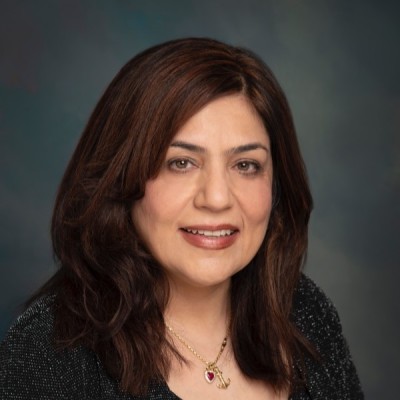
Mojgan M. Haghanikar
- Courses2
- Reviews4
- School: Towson University
- Campus:
- Department: Physics
- Email address: Join to see
- Phone: Join to see
-
Location:
8000 York Rd
Towson, MD - 21252 - Dates at Towson University: November 2013 - April 2015
- Office Hours: Join to see
Biography
Towson University - Physics
Resume
2017
St. Francis College
Teaching Physics and Astronomy
California Polytechnic State University
Faculty Physics
Media Design for Visualization in Physics
SUNY Polytechnic Institute
Towson University
Towson MD
Visiting Assistant Professor of Physics
Eastern Connecticut State University
University of Hartford
Teaching and curriculum development for reformed algebra course
Visiting Assistant Professor of Physics and Astronomy
Brooklyn
NY
Physics Faculty
St. Francis College
University of Glasgow
Scotland
CHEVNING Scholar
Embassy of United Kingdom
Kansas state university
Research Foundation
The College of Nanoscale Science and Engineering
I develop modules on semiconductors
industrial education\nI created a portal for workforce training
advance manufacturing and technical career pathways
Research Scientist
2016
New York University
Research Foundation
The College of Nanoscale Science and Engineering
New York University
English
CHEVENING SCHOLARSHIP
UNINTED KINGDOM
2007
Doctor of Philosophy (Ph.D.)
Physics Education
Kansas State University
2004
Master’s Degree
Physics Education
Kansas State University
2002
Master of Science (MSc)
Astronomy Education
The University of Glasgow
Astronomy
Hybrid astronomy
Calculus based Physics
Online Asynchronous chemistry
Hybrid Astronomy
University of Maryland
Grant Writing
Abstract Archive Detail
The rapid advancements in three-dimensional digital imaging
virtual and augmented reality
have allowed extensive possibilities to elucidate scientific communication. Growing body of research (Hegarty
2014) in psychometrics and science education...
Media — IEEE Games
Entertainment
& Media 2019
In the last decade
accelerated development in consumer electronics and computational technologies have radically altered platforms for storytelling. Expanded presentation outlets and new production models
decentralized distribution channels
and...
Media — IEEE Games
Entertainment
& Media 2019
Knowledge Frontiers: From the Classroom to the Operating Room
XR and Ethics: Living in a World of Abundant Experiences Maya Georgieva is a futurist and educational strategist. Her work on the future of learning is featured in education and industry forums and publications across the globe. As the Director of...
Knowledge Frontiers: From the Classroom to the Operating Room
STEM Colloquium 10/17/2017: Thinking about Complex Systems
This material is based upon work supported by the National Science Foundation under Grant No. 1239945. Any opinions
findings
and conclusions or recommendat...
STEM Colloquium 10/17/2017: Thinking about Complex Systems
NatureVolve issue 6 (digital
full version) | naturevolve
The complete version of NatureVolve issue 6 in digital PDF format - featuring subjects across medical science
wildlife conservation
nature-inspired fine art and written word.
NatureVolve issue 6 (digital
full version) | naturevolve
Selected to serving in the curriculum committee
The State University of New York
Developing workshops
Developing expereiments and organzation
Physics
Higher Education
Storyboarding
Educational Consulting
Writing
Grant Writing
Start-ups
Mathematical Modeling
Quantitative Research
Instructional Design
Distance Learning
Academic Advising
Pedagogy
Online Gaming
Online Teaching
Chemistry
Publications
Statistics
Content Development
Semiconductors
Cyberlearning and Augmented Reality in STEM Education
This paper introduces a new type of science labs that enhances students' knowledge structure and in particular
helps students to visualize abstract processes. The term vista portrays an extensive mental view over a stretched of time and series of events and the definition of vista exactly captures the goal of this project. Usually
meaningful learning involves link making between various concepts
events
and processes over the span of time and space. Students often have difficulties particularly when learning involves pondering on long processes
fast transitions
many variable interactions or whenever the space and time in a context are counterintuitive or obscured.
Cyberlearning and Augmented Reality in STEM Education
Understanding & Accessibility in Physics
Dean Zollman
Exploring Students' Patterns of Reasoning
Capstone Physics Projects
Developing PASCO Capstone Physics Labs
Semiconductor modules
Research into Practice
Automated response system providing response to physics teachers
online platform for physics teachers
Exploring Students' Patterns of Reasoning
\nTo probe students’ reasoning
we developed open-ended written content questions with the distinguishing feature of applying recently learned concepts in a new context. We devised a protocol for developing written content questions that provided a common structure for probing and classifying students’ sophistication level of reasoning. In designing our protocol
we considered several distinct criteria
and classified students’ responses based on their performance for each criterion.\nFirst
we classified concepts into three types: Descriptive
Hypothetical
and Theoretical and categorized the abstraction levels of the responses in terms of the types of concepts and the inter-relationship between the concepts. Second
we devised a rubric based on Bloom’s revised taxonomy with seven traits (both knowledge types and cognitive processes) and a defined set of criteria to evaluate each trait.\nIn addition
we analyzed conceptual structure of students’ responses
based on conceptual classification schemes
and clustered students’ responses into six categories. We derived regression model
to estimate the relationship between the sophistication of the categories of conceptual structure and RTOP scores. However
the outcome variable with six categories required a more complicated regression model
known as multinomial logistic regression
generalized from binary logistic regression.\nWith the large amount of collected data
we found that the likelihood of the higher cognitive processes were in favor of classes with higher measures on inquiry. However
the usage of more abstract concepts with higher order conceptual structures was less prevalent in higher RTOP courses.\nKeywords: Reasoning; Rubric; Reform; Inquiry teaching; RTOP; reformed teaching observation protocol; logisitic regression; Bloom's revised taxonomy; National study of undergraduate science; transfer of learning; conceptual strcuture; backward design; Multinomial logistic regression; binary logistic regression
Developing Self diagnostic Assessment in Astronomy Education
M Haghanikar
Mojgan
Kansas state university
Eastern Connecticut State University
Towson University
California Polytechnic State University
Embassy of United Kingdom
SUNY Polytechnic Institute
University of Hartford
